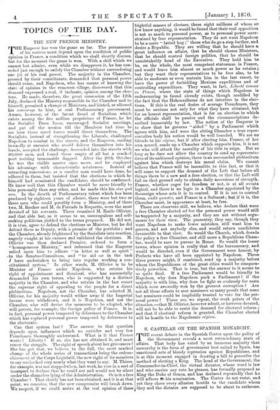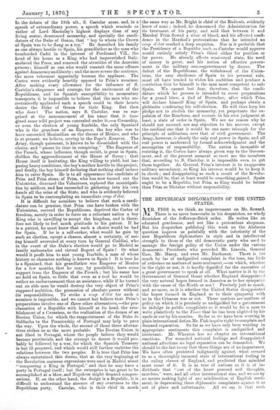S. CASTELAR ON THE SPANISH MONARCHY.
THE recent debate in the Spanish Cortes upon the policy of the Government reveals a most extraordinary state of affairs. That body has voted by an immense majority that monarchy is the form of government best suited to Spain, has sanctioned acts of bloody repression against Republicans, and is at this moment engaged in drawing a bill to prescribe the method of electing a King. The head of the Government, the Commander-in-Chief, the virtual dictator, whose word is law and who carries any vote he pleases, has formally proposed as King the Duke of Genoa, and has declared repeatedly that he will adhere his nomination. The Cortes do not resist, and yet they cheer every allusion hostile to the candidate whom In the debate of the 19th ult., S. Castelar arose, and, in a speech of extraordinary power, a speech which reminds us rather of Lord Macaulay's highest displays than of any living orator, denounced monarchy, and specially the candi- dature of the Duke of Genoa, that "boy to whom the Crown of Spain was to be flung as a toy." He described his family as one always hostile to Spain, his grandfather as the man who bombarded Cadiz in the interest of Ferdinand VII., the head of his house as a King who had impoverished Italy, enslaved the Press, and renewed the atrocities of the Austrian prisons ; himself as one who would commit the same offence against democracy and liberty; and the more severe the sentence, the more vehement apparently became the applause. The Cortes were evidently heartily opposed to Prim's nominee. After making every allowance for the influence of S. Castelar's eloquence and courage, for the excitement of the Republicans, and for Spanish susceptibility to momentary transports, it is impossible to believe that the men who un- restrainedly applauded such a speech could in their hearts -desire the Duke of Genoa for their King. But then who does ? The nation, says S. Castelar, was so sur- prised at the announcement of his name that it ima- gined some wild project was concealed under it,—a Cassarship, or even the election of young Iturbide, the only Spaniard who is the grandson of an Emperor, the boy who was to have succeeded Maximilian on the throne of Mexico, and who is at present, we believe, serving in the Pope's Zouaves. The Army, though quiescent, is known to be dissatisfied with the -choice, and "passes its time in conspiring." The Emperor of the French, whose influence, though occult, is great in Spain, dislikes the aggrandizement of the House of Savoy: that House itself is hesitating, the King willing to yield, but im- posing heavy conditions, the boy's mother hostile to the project, and finally, the boy himself declaring that nothing shall induce him to enter Spain. He is to all appearance the candidate of Prim and Prim alone, of Prim, who has now turned out the Unionistas, disarmed the Volunteers, replaced the municipali- ties by soldiers, and has succeeded in gathering into his own hands all the reins of the State, and who is evidently believed in Spain to be contemplating an immediate coup d'e'tat.
It is difficult for outsiders to believe that such a candi- dature can be genuine, that Prim can have broken with the Znionistas, coerced the Republicans, deprived the Cortes of freedom, merely in order to force on a reluctant nation a boy King who is unwilling to accept the kingdom, and is there- fore not likely to feel much gratitude to his patron. If he is a patriot, he must know that such a choice would be bad for Spain, If he is a self-seeker, what would he gain by such an election, except a chance, almost a certainty, of see- ing himself overruled at every turn by General Cialdini, who in the event of the Duke's election would go to Madrid as family ambassador and virtual Regent of Spain ? Or what would it profit him to seat young Iturbide, a man of whose history or character nothing is known in Spain ? It is true he is a Spaniard, that his grandfather was Emperor of Mexico for a few months, that he may, by possibility, have some support from the Emperor of the French ; but his name has no hold on Spain, so little that even as a tool he would be rather an embarrassment than an assistance, while if he turned -out an able man he would destroy the very object of Prim's supposed ambition, the possession of absolute power without its responsibilities. To strike a coup cretat for such a arominee is impossible, and we cannot but believe that Prim's .preparations involve one of three other alternatives,—the pro- .clamation of a Republic with himself at its head, the esta- blishment of a Cassarism, or the realization of the dream of an Iberian Union, for which the reappointment of the Duke de
• Saldanha to the Premiership of Portugal may help to pave the way. Upon the whole, the second of those three alterna- lives strikes us as the more probable. The Iberian Union is not liked in Portugal, where the people believe they would -become provincials, and the attempt to decree it would pro- bably be followed by a war, for which the Spanish Treasury is but ill prepared, and which would still further embitter the relations between the two peoples. It is true that Prim has always entertained this dream, that at the very beginning of the Revolution ominous expressions were used in Madrid about "conquering a King in Portugal," and that he may have a party in Portugal itself ; but the enterprise is too great to be accomplished at a blow, and Napoleon might demand compen- sations. If, on the other hand, the design is a Republic, it is difficult to understand the absence of any overtures to the Republican party. Castelar, who is their chief in much
the same way as Mr. Bright is chief of the Radicals, evidently knew of none ; indeed, he denounced the Administration for its treatment of his party, and said that between it and Marshal Prim flowed a river of blood, and his affected confi- dence in the Marshal's protestations that he intended no coup d'e'tat marked a deep suspicion. Nor is it probable that the Presidency of a Republic such as Castelar would approve would entirely satisfy Prim's thirst either for position or for power. He already affects semi-royal state, his need of money is great, and his notion of effective govern- ment is the military one,—government by decree. The defeat of the Republicans, the withdrawal of the Union- istas, the easy obedience of Spain to his personal rule, must all have tended to widen his ambition and produce a conviction that he himself is the man most competent to rule Spain. We cannot but fear, therefore, that the candi- dature which he presses is intended to cover preparations for a grand blow, a 2nd of December, after which Prim will declare himself King of Spain, and perhaps obtain a plebiscite confirming his self-election. He will thus keep his pledge not to abolish the monarchy, yet perpetuate the ex- pulsion of the Bourbons, and restore, in his own judgment at least, a state of order in Spain. We see no reason why he should not succeed, nor any objection to his success, except the cardinal one that it would be one more triumph for the principle of militarism over that of civil government. The Army, however, is clearly the only real power in Spain, and all real power is moderated by formal acknowledgment and the assumption of responsibility. The nation is incapable of resisting it, the Cortes have always given way to the Govern- ment, and at the present moment so inert are the members that, according to S. Castelar, it is impossible even to get them together. As General, Prim's interest is to exaggerate military ascendancy, as King his interest would be to keep it in check ; and disappointing as such a result of the Revolu- tion would be, that at least would be something gained. Spain ought to be a Republic, but Prim as King would be better than Prim as Dictator without responsibility.











































 Previous page
Previous page